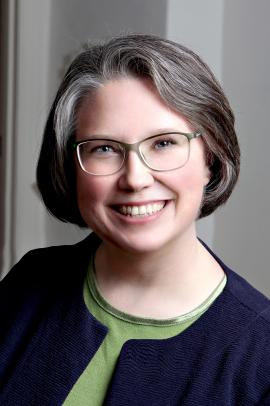Michelle Brooks has been studying the local history of Jefferson City and Lincoln University for more than 20 years, first as a reporter for the Jefferson City News Tribune and today as a published author. Her books include Hidden History of Jefferson City and Lost Jefferson City with The History Press and Interesting Women of the Capital City and Buried Jefferson City History through Kindle Direct Publishing. She is a research analyst at the Missouri State Archives.
Email: showmereporter@yahoo.com
-
Available Presentations (h3 text)
Available Presentations
Finding the Founders: 62nd U.S. Colored Troops
All but a handful of the surviving soldiers of the 1st Missouri Infantry of African Descent, later the 62nd U.S. Colored Troops, had some degree of literacy. Fighting in the last battle of the Civil War – The Battle of Palmito Ranch – may have been their military accomplishment, but they made an immense impact in their Missouri communities as preachers, teachers, farmers and political leaders. They also influenced the future of all Black Missourians by founding Lincoln Institute in 1866 in Jefferson City. They trusted Richard Baxter Foster, a white lieutenant with the 62nd, with their dream and their significant contributions. Foster was a school teacher who rode with John Brown in Kansas before the war and returned their to found several pioneer Congregationalist churches after establishing the school. Sgt. Major John Jeffries, who earned the highest non-commissioned rank among the 62nd soldiers, was among Lincoln Institutes first students and then an early instructor. He then moved to Rolla to establish a school there and then opened his own business. He is the epitome of the 62nd USCT’s story. Meet these individuals who were freed from slavery by military service and returned from war to build their communities.
Tuskegee Airmen from Lincoln University
As the U.S. anticipated entering World War II, it addressed the need for experience pilots by establishing Civil Pilot Training (CPT) programs at universities and airfields. Only a handful of now Historically Black Colleges and Universities, were selected, since no military arm existed at the time for African-Americans in aviation. Lincoln University was the only site serving Black pilots west of the Mississippi River. The Lincoln CPT program trained 50 pilots before the war began. Most of them went on to some form of military service, more than half in U.S. Army Air Corps. Three of these men ew combat missions in the Europe. Capt. Wendell Pruitt was an acclaimed acrobatic flyer from St. Louis. Capt. Richard Pullam became a squadron commander before the military was desegregated. And Lt. Wilbur Long spent the end of the war as a Prisoner of War in Poland. Several ground crew also made impressive contributions, like Sgt. Clovis Bordeaux, the first Lincolnite to join the U.S. Army Air Corps and eventually was a rocket scientist for Hughes Aircraft. Meet some of Lincoln University’s military alumni who helped influence desegregation in the military and continue to break racial barriers after their service.
Program Underwriting
-
Program Underwriting
Each speaker can provide up to four presentations to underserved rural communities at no cost to the hosting institution. For the presentation to be covered by program underwriting, the host organization must be nonprofit and located outside Boone, Greene, Jackson, and St. Louis counties and outside the city of St. Louis.
For presentations that qualify for program underwriting, there is no cost to the host organization. The number of underwritten presentations this speaker has remaining is indicated below.
Requesting a Speaker
-
Requesting a Speaker
Contact the speaker directly to make arrangements.

